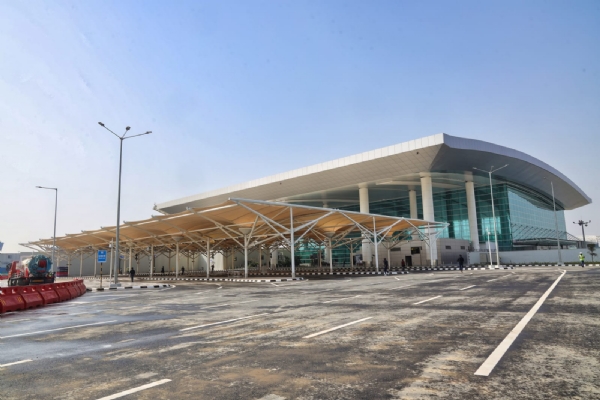Delhi airport's arrival terminal T1 becomes operational
At the airport, the entire arrivals operations of Terminal 1 will now shift from the existing facility to the new one.
Total Views |
New Delhi, February 24: Delhi airport's new state-of-the-art arrival terminal at T1 has become operational with arrival of domestic air passengers, on Thursday. This terminal has been built as a part of the ongoing phase 3A expansion project, the large-scale development and modernisation plan for Indira Gandhi International Airport.

The new terminal will offer a distinctive experience to passengers with a contemporary meet and greet zone, plush forecourt area, including landscaping and kiosks for food and beverage (F&B), retail and expanded parking area for cars.
The new Arrival Terminal has been built as a green building, keeping globally renowned LEED (Leadership in Energy and Environmental Design) green building standards in mind. As part of it, DIAL has used the day-light concept in the terminal building, which will reduce electricity consumption. Also, lighting fixtures and equipment like HVAC and baggage belts are energy efficient and thus consume less power, stated Jaipuriar.

Videh Kumar Jaipuriar, CEO of Delhi International Airport Ltd (DIAL) said, "The new terminal has been developed by DIAL, a GMR Infrastructure Ltd led consortium, in line with its commitment to enhancing passenger experience with safe, secure and sustainable infrastructural facilities."
The first flight to arrive at the new terminal was IndiGo flight 6E 6532 from Goa at 03:20 am on Thursday. The entire arrivals operations of T1 (IndiGo and SpiceJet) will now shift from the existing facility to the new one. Departure operations will continue from the existing terminal, and will eventually be integrated with the new arrivals hall, after completion of the expansion works, said Jaipuriar.
The new terminal will offer a distinctive experience to passengers with a contemporary meet and greet zone, plush forecourt area, including landscaping and kiosks for food and beverage (F&B), retail and expanded parking area for cars.
Also Read | Atal Tunnel: a blessing for development of Himachal Pradesh!
It has also been stated that on the city side, the pickup lanes outside the arrival terminal have been realigned and widened with three additional lanes, taking the total number of lanes to 11.
The new Arrival Terminal has been built as a green building, keeping globally renowned LEED (Leadership in Energy and Environmental Design) green building standards in mind. As part of it, DIAL has used the day-light concept in the terminal building, which will reduce electricity consumption. Also, lighting fixtures and equipment like HVAC and baggage belts are energy efficient and thus consume less power, stated Jaipuriar.